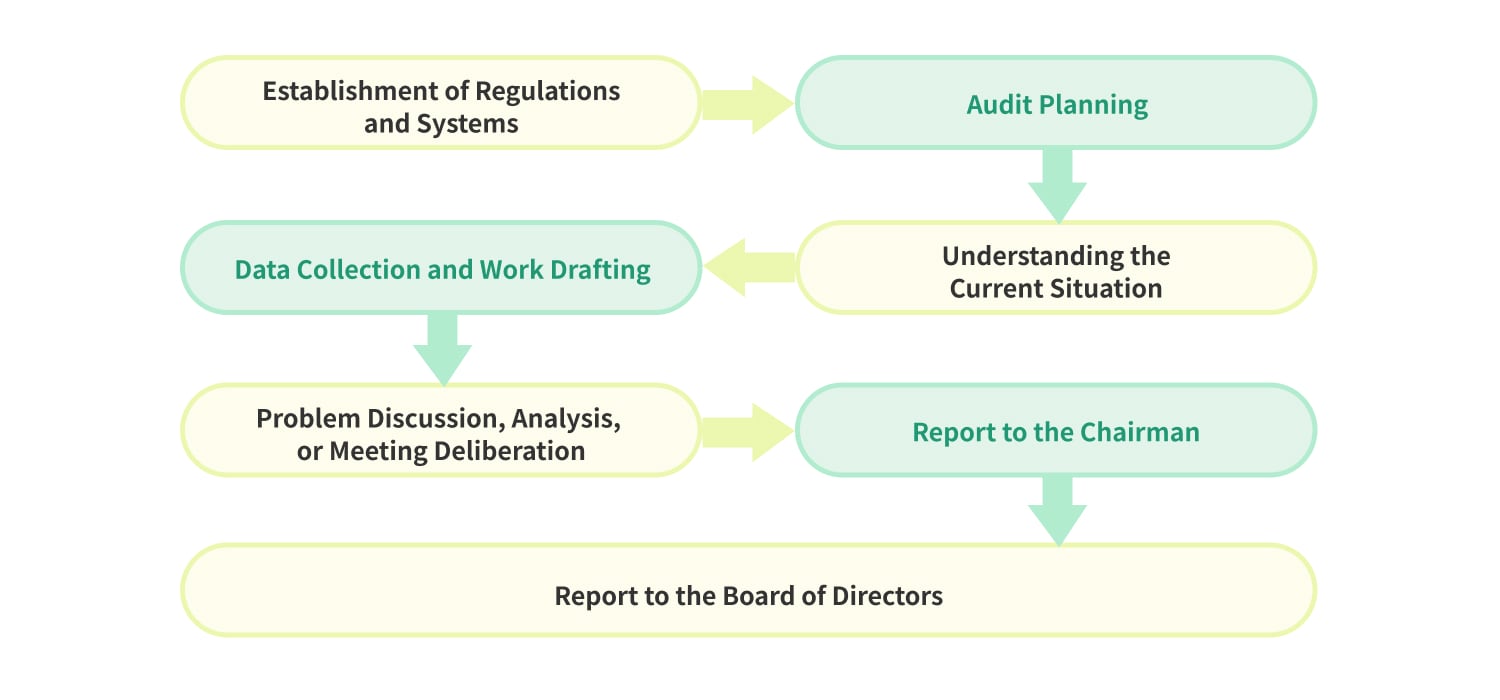Internal Audit
The Internal Audit Department of GCM (Great China Metal) is positioned as an impartial and independent professional unit that reports directly to the Board of Directors. In addition to submitting monthly reports on audit execution to the independent directors, the department also provides comprehensive reports during regular board meetings. This organizational structure ensures the independence and objectivity of internal audits, effectively enhancing the company’s overall governance and operational transparency.
The Internal Audit Department is committed to promoting various audit functions to ensure that the company’s operations comply with relevant legal and regulatory requirements, while strictly adhering to corporate ethics and industry standards. Through systematic and regular audit inspections, the department provides an effective risk management and monitoring mechanism, assisting all departments in continuously improving their processes and enhancing operational efficiency.
When any non-compliance or violation is identified, the audit department immediately activates a reporting mechanism to inform the Board of Directors and works closely with the relevant responsible units to formulate concrete corrective measures. At the same time, we continue to strengthen the professional capabilities and auditing capacity of the Internal Audit Department through ongoing institutional optimization and personnel development, ensuring continuous improvement in corporate governance and creating greater value protection for all shareholders.

| Internal Audit | |
|---|---|
| Internal Audit Responsibilities | Assist the Board of Directors and management in inspecting and reviewing deficiencies in the internal control system and in assessing the effectiveness and efficiency of operations, to ensure the continued effective implementation of the internal control system and to serve as a basis for reviewing and revising the internal control system. |
| Internal Audit Operations | Review the internal controls of various operations and report on the adequacy of their design, practical implementation, effectiveness, and efficiency. Review the self-assessment of internal control systems by various departments, covering areas such as operational effectiveness and efficiency, reliability, timeliness, transparency of reporting, and compliance with regulations. |
| Self-assessment of Internal Control | Conduct an effective evaluation of the design and implementation of various internal controls from the previous year, including any identified deficiencies and anomalies in internal controls and their subsequent improvements. This evaluation serves as the basis for the Board of Directors to assess the effectiveness of internal controls and to issue the internal control statement. |
| Internal Audit Execution | The Internal Audit Department consolidates the "Internal Control Component Assessment Forms," reviews the status of corrections for internal control deficiencies and anomalies, and examines the actual implementation of CSA (Control Self-Assessment) by various departments and subsidiaries. It then completes the "Overall Internal Control Assessment Form" and evaluates the effectiveness of internal controls. If the self-assessment results reveal significant deficiencies, a "Internal Control System Improvement and Action Plan Form" should be completed separately and submitted to the General Manager for approval. |
| Appointment and Dismissal of Internal Audit Personnel | The appointment, dismissal, evaluation, and compensation of the company's internal audit personnel are handled in accordance with the "Personnel Management Regulations" and the "Employee Employment Management Measures." Evaluations are conducted twice a year. The aforementioned appointments, dismissals, evaluations, and compensation are submitted for approval to the Chairman through the approval process. The related regulations have been disclosed in the internal regulations section of the company's intranet. |
| Internal Audit Education and Training | In addition to internal regulations, new audit personnel are also familiarized with important laws and regulations, such as the "Regulations Governing Establishment of Internal Control Systems by Public Companies" and the "Regulations Governing Loaning of Funds and Making of Endorsements/Guarantees by Public Companies." New auditors must complete an "18-hour external training course for new audit personnel" within six months of joining. The Audit Department currently has a staff of two. According to Article 17 of the "Regulations Governing Establishment of Internal Control Systems by Public Companies," audit personnel must undergo 12 hours of on-the-job training annually. |

